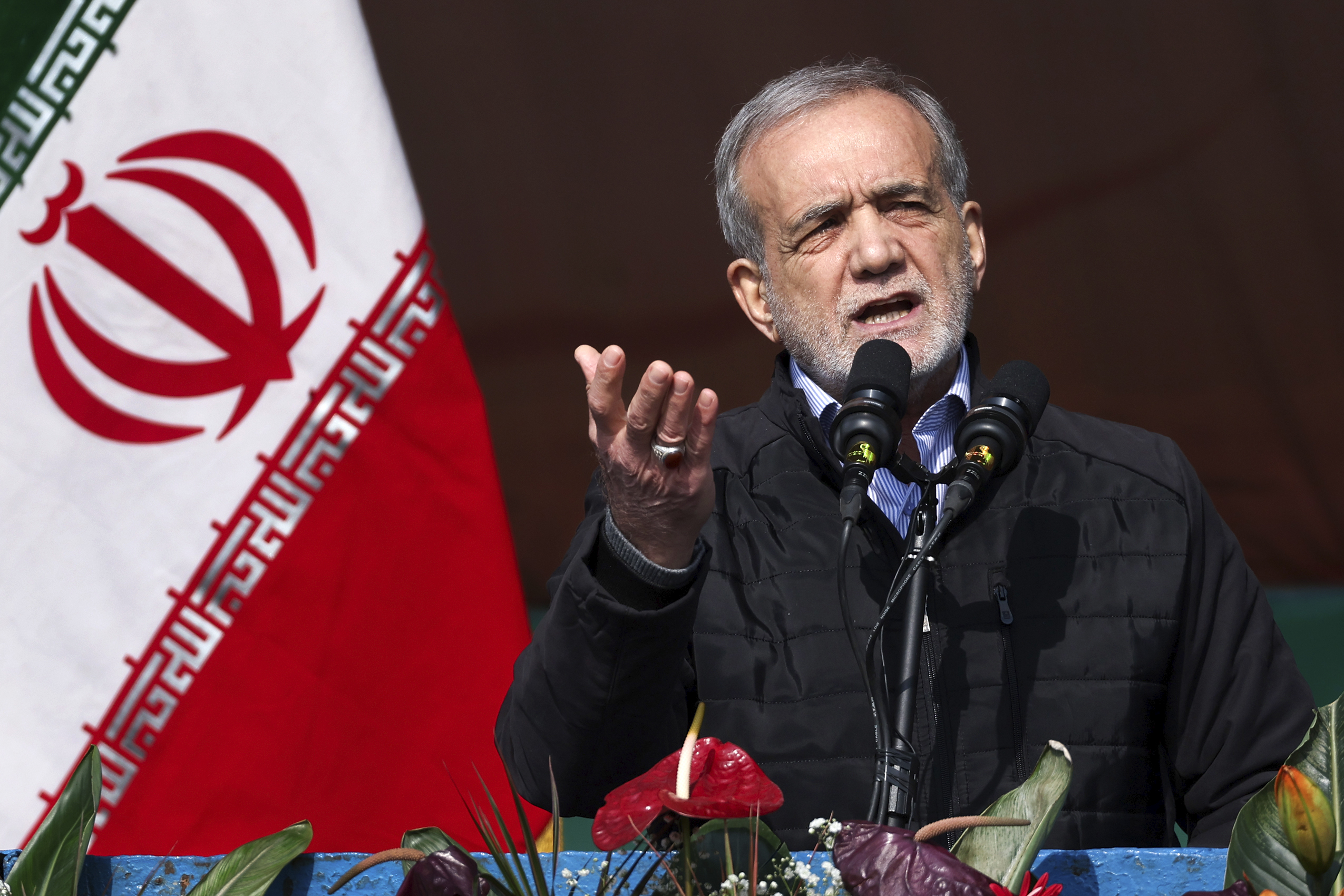
Pezeshkian also criticized the United States for pursuing a ‘contradictory’ approach to Iran, saying that while President Donald Trump claims he wants to negotiate a nuclear deal, he also imposes harsh sanctions on Tehran.
By Ailin Vilches Arguello, The Algemeiner
Iranian President Masoud Pezeshkian on Thursday warned that if “enemies” attack Iran’s nuclear facilities, the country will quickly rebuild and multiply them, seemingly responding to new reports of a possible Israeli strike on Iranian nuclear sites by the middle of this year.
“[Enemies] threaten us that they will hit our nuclear facilities … If you strike a hundred of those, we will build a thousand other ones,” Pezeshkian said during a speech in the southern province of Bushehr, according to Iranian state media.
“You can target the buildings and locations, but you cannot target those who build them,” he said, adding that Iranian “experts” will continue to expand the country’s nuclear program.
Pezeshkian’s comments came after a Washington Post report claimed that Israel may launch a preemptive strike on Iran’s nuclear facilities in Fordow and Natanz by mid-year, citing US intelligence assessments.
Such an operation could exploit extensive damage done to Iran’s military capabilities in October, when Israel devastated Iranian air defense systems and ballistic missile production facilities in a coordinated, three-wave strike.
The attack was a response to Iran targeting the Israeli homeland with 181 ballistic missiles weeks earlier.
During his meeting in Bushehr, Pezeshkian criticized the United States for pursuing a “contradictory” approach to Iran, saying that while President Donald Trump claims he wants to negotiate a nuclear deal, he also imposes harsh sanctions on Tehran.
“The enemy wants us to be humiliated before them with sanctions and threats, but we will not be subjugated and we will solve our problems by relying on our people,” Pezeshkian said. “We will run the country by relying on our domestic capabilities.”
Last week, Trump signed a presidential memorandum restoring his “maximum pressure” campaign on Iran that includes efforts to drive its oil exports down to zero in order to stop Tehran from obtaining a nuclear weapon.
However, Trump has also denied that the US and Israel are planning to carry out a military strike on Iran, saying he instead wants to reach a “nuclear peace agreement” with Tehran.
In response to Trump’s comments, Iran’s so-called “supreme leader,” Ayatollah Ali Khamenei, rejected the idea of negotiating with Washington, calling the idea “unwise” and “dishonorable” days later.
In an interview with Fox News, Trump also mentioned the possibility of Israel striking Iran, emphasizing that he would rather reach an agreement with Tehran to stop it from obtaining nuclear weapons.
“Everyone thinks Israel, with our help or our approval, will go in and bomb the hell out of them. I would prefer that not to happen,” Trump said.
Amid increasing tensions, the commander of Iran’s conventional air force, Hamid Vahedi, also threatened to retaliate against any attack on Tehran.
“We tell all countries, friends and foes alike, that our country’s doctrine is defensive, but we will respond with force against any enemy attack,” he said.
The US, Israel, and other allied countries fear that Iran’s nuclear program is ultimately designed to produce nuclear bombs.
Iran has claimed that its nuclear program is for civilian purposes rather than building weapons. However, the UN’s nuclear watchdog, the International Atomic Energy Agency (IAEA), reported in December that Iran had greatly accelerated uranium enrichment to up to 60 percent purity, close to the roughly 90 percent weapons-grade level, at its Fordow site dug into a mountain.
The UK, France, and Germany said in a statement at the time that there is no “credible civilian justification” for Iran’s recent nuclear activity, arguing it “gives Iran the capability to rapidly produce sufficient fissile material for multiple nuclear weapons.”
According to US intelligence reports detailed in The Wall Street Journal, US officials believe that an attack on Iran’s nuclear facilities would only delay Tehran’s program for a few weeks or months, yet Israeli officials believe it would have a significant impact.
Israel is reportedly considering two potential strike options, both of which would require US support for aerial refueling, intelligence gathering, and surveillance.
Of these two options, one is reported to involve Israeli fighter jets launching ballistic missiles from the air without entering Iranian territory, while the other would see aircraft deploying bunker-busting bombs over Iranian nuclear sites. The Trump administration recently approved the sale of training kits for this type of strike.
In November, Israeli Defense Minister Israel Katz said Iran was “more vulnerable than ever to attacks on its nuclear facilities.”
“We have the opportunity to achieve our most important goal – to thwart and eliminate the existential threat to the State of Israel,” he said in a post on X.
In my first meeting today with the @IDF General Staff Forum, I emphasized: Iran is more exposed than ever to strikes on its nuclear facilities. We have the opportunity to achieve our most important goal – to thwart and eliminate the existential threat to the State of Israel. pic.twitter.com/HX4Z6IO8iQ
— ישראל כ”ץ Israel Katz (@Israel_katz) November 11, 2024
Iran is the chief international backer of Hamas, providing the terrorist group with weapons, funding, and training.
According to media reports based on documents seized by the Israeli military in Gaza last year, Iran had been informed about Hamas’s plan to invade southern Israel and massacre and kidnap civilians on Oct. 7, 2023, months in advance.
The post Iran to build 1,000 nuclear sites if ‘enemy’ destroys 100, president says amid reports of possible Israeli strike appeared first on World Israel News.